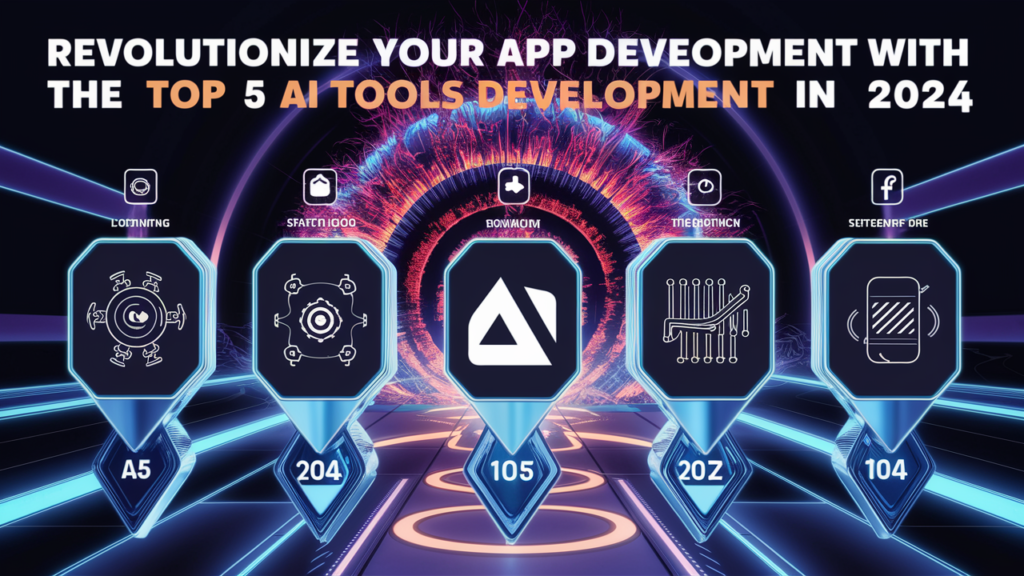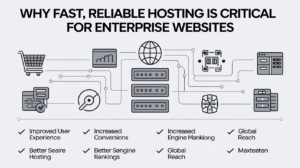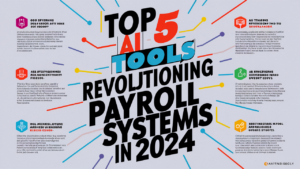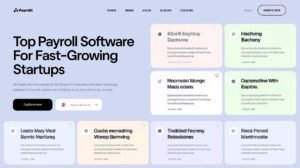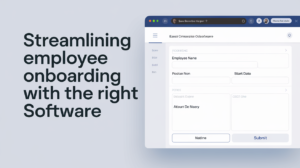In today’s fast-evolving world of technology, Top AI tools for app development have become integral to the app development process. For developers striving to stay ahead of the curve, leveraging the top AI tools for app development in 2024 is not just desirable—it’s essential. These tools enhance productivity, reduce errors, and deliver superior user experiences. Let’s dive into the five game-changing AI tools that are set to revolutionize the app development landscape in 2024. 🚀
The Rise of AI in App Development
Before we dive into the tools, it’s important to understand why Top AI tools for app development is so crucial today. AI-driven development leverages machine learning (ML), natural language processing (NLP), and predictive analytics to automate complex tasks, streamline workflows, and offer innovative features that were previously unimaginable.
Key Benefits of AI in App Development:
- Automation: Handles repetitive tasks, freeing up developers for more complex challenges.
- Efficiency: Speeds up the development process by automating coding and testing.
- Accuracy: Reduces human error, ensuring more robust and reliable apps.
- Innovation: Integrates cutting-edge functionalities like voice recognition and predictive text.
Top 5 AI Tools for App Development in 2024 💡
Here’s a closer look at the top AI tools for app development that developers should consider using in 2024.
1. TensorFlow
TensorFlow is an open-source machine learning framework developed by Google. It has become a staple for developers working on AI-driven apps, offering flexibility and high performance.
Key Features:
- Flexible Architecture: Works across multiple platforms, from mobile devices to servers.
- High Performance: Optimized for speed and scalability.
- Community Support: Extensive documentation and a large developer community.
Use Case:
Best suited for apps requiring real-time data processing, like image recognition or NLP applications.
2. Microsoft Azure AI
Microsoft Azure AI offers a robust suite of AI services, perfect for enterprises. From cognitive APIs to machine learning models, it’s a comprehensive tool for seamless AI integration.
Key Features:
- Scalability: Easily scalable as your app grows.
- Integration: Seamless with Microsoft’s vast ecosystem.
- Security: Advanced features to protect sensitive data.
Use Case:
Great for enterprise-level apps requiring advanced analytics, predictive modeling, and strong security.
3. IBM Watson
IBM Watson is a powerful AI tool known for its AI-powered APIs that cater to various functionalities, including language processing and visual recognition.
Key Features:
- Versatile AI APIs: Ranging from NLP to image recognition.
- Cloud Integration: Easily deploys on IBM Cloud.
- Developer-Friendly Toolkits: Makes quick AI model deployment simple.
Use Case:
Ideal for apps needing advanced language understanding or augmented reality applications.
4. Firebase ML Kit
Firebase ML Kit from Google is designed for mobile apps. It allows developers to integrate machine learning with ease through pre-trained models and custom ML models.
Key Features:
- Cross-Platform: Supports both iOS and Android.
- Easy Integration: Simple APIs for seamless mobile app integration.
- Pre-Trained Models: Access powerful models for tasks like text recognition or face detection.
Use Case:
Best for mobile apps that need text recognition, face detection, or barcode scanning capabilities.
5. Hugging Face Transformers
Hugging Face Transformers has become synonymous with state-of-the-art NLP applications. It offers a wide range of pre-trained models that developers can easily fine-tune for custom NLP tasks.
Key Features:
- NLP Specialization: Perfect for advanced text processing tasks.
- Model Hub: Access to numerous pre-trained models.
- Flexibility: Allows easy fine-tuning of models to suit specific app requirements.
Use Case:
A must-have for apps needing text processing like automated customer support or intelligent search engines.
How to Choose the Right AI Tool for Your App Development 🧐
1. Application Type
- Simple Apps: Use Firebase ML Kit or Hugging Face for less complex tasks.
- Complex Apps: Opt for TensorFlow or Microsoft Azure AI for heavy-duty projects requiring real-time processing or advanced features.
2. Developer Skill Level
- Beginners: Firebase ML Kit and IBM Watson provide ease of use with pre-trained models.
- Experienced Developers: TensorFlow offers flexibility and power for custom-built models.
3. Cost Considerations
- Low Budget: Start with free versions or entry-level pricing on Hugging Face or Firebase ML Kit.
- Enterprise Solutions: Consider investing in more robust options like Microsoft Azure AI or IBM Watson for comprehensive solutions.
Future Trends in AI for App Development 🔮
The future of AI in app development is bright. Here’s what to expect:
1. AI-Driven Personalization
Expect more personalized experiences, as apps use AI to adapt content and features based on user behavior.
2. Enhanced Security
AI will bolster app security, identifying threats and vulnerabilities in real time. 🔐
3. Low-Code/No-Code Platforms
AI-powered low-code/no-code platforms will enable non-developers to create sophisticated apps, democratizing app development.
4. AI in AR/VR
AR and VR will become more immersive as AI integrates to create rich, interactive user experiences. 🎮
5. Improved Data Analytics
AI tools will continue advancing data analytics, offering deeper insights and better decision-making.
Conclusion 🌟
The top AI tools for app development in 2024 will transform how developers approach their projects. By leveraging these tools, you can create high-quality apps faster, with fewer errors, and greater innovation. Whether you’re an independent developer or part of a larger team, integrating AI into your workflow is essential for staying competitive in this fast-paced tech landscape.
Invest in AI tools today to future-proof your app development process and deliver cutting-edge solutions in 2024 and beyond! 💼📱

